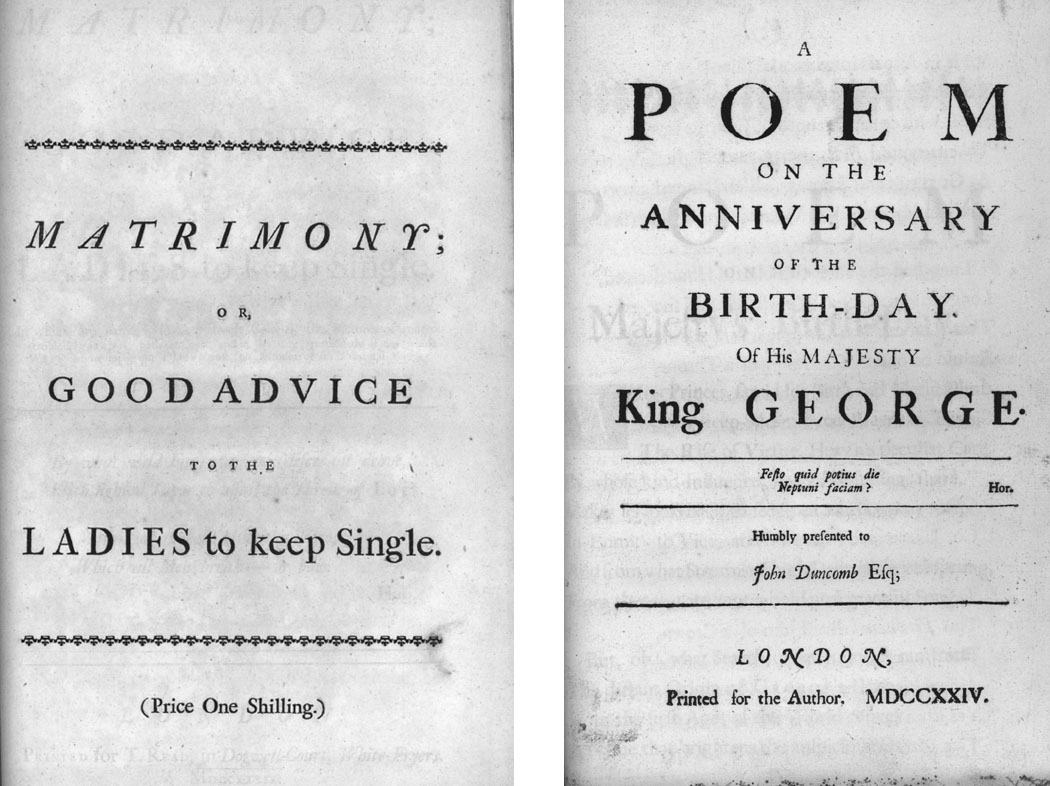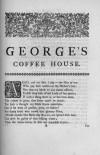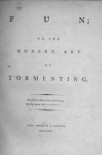By: Kevin Grace
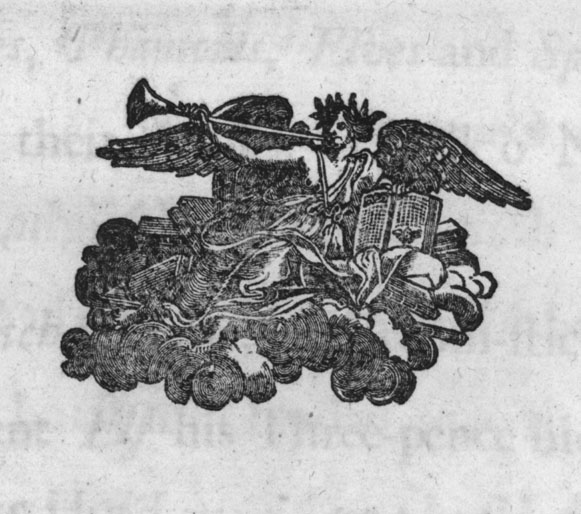 Because April is celebrated as National Poetry Month, over the next few weeks the Archives & Rare Books Library will blog about some of its significant holdings in the Rare Books Collection. Perhaps the best subject with which to begin is ARB’s outstanding collection of 18th century poetical pamphlets. Eighteenth-century literature is one of the hallmarks of the rare books holdings, encompassing drama, poetry, fiction, philosophy, theology, travel, history, and geography. And the core of this area is what we have traditionally called the Anonymous Poetical Pamphlet Collection.
Because April is celebrated as National Poetry Month, over the next few weeks the Archives & Rare Books Library will blog about some of its significant holdings in the Rare Books Collection. Perhaps the best subject with which to begin is ARB’s outstanding collection of 18th century poetical pamphlets. Eighteenth-century literature is one of the hallmarks of the rare books holdings, encompassing drama, poetry, fiction, philosophy, theology, travel, history, and geography. And the core of this area is what we have traditionally called the Anonymous Poetical Pamphlet Collection.

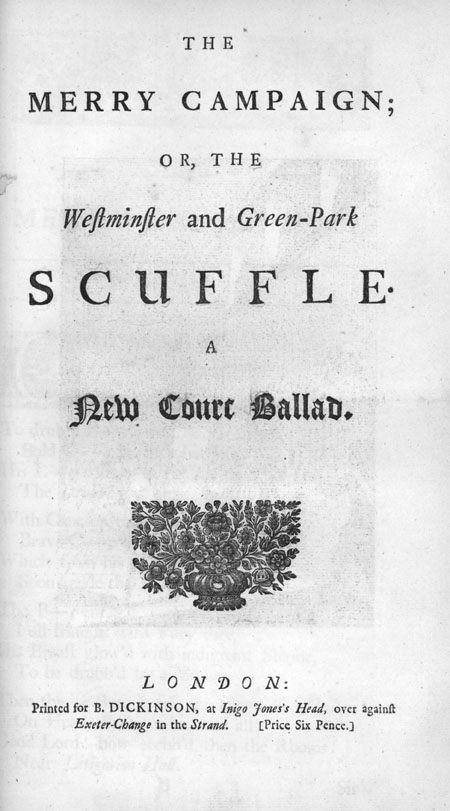 These pamphlets, consisting of approximately 1100 anonymous poems published between 1701 and 1801, were purchased in 1933 from London bookseller Percy Dobell, hence another name we attach to them, the “Dobell Collection.” Most of them were published in London but there are also a great number from smaller English cities as well as Edinburgh, Scotland and Dublin, Ireland. The collection of these poems include amatory verse, odes, satires, verse epistles, lampoons, elegies, and ballads – all chronicling the Enlightenment decades by addressing social class (Miss Kitty, a Parody on Lenora, 1797), politics, romance, religion, and specific individuals in royalty (A poem dedicated to the Queen and presented to the Congress at Utrecht, 1713), philosophy (Tit for Tat, To which is annex’d an Epistle from a Nobleman to a Doctor of Divinity, 1734) and government. Many of them are pointedly insulting, and others somewhat bawdy. A few are drinking songs, such as Beef and Butt Beer, Against Mum and Pumpernickel (1743), a disparaging jab at German soldiers:
These pamphlets, consisting of approximately 1100 anonymous poems published between 1701 and 1801, were purchased in 1933 from London bookseller Percy Dobell, hence another name we attach to them, the “Dobell Collection.” Most of them were published in London but there are also a great number from smaller English cities as well as Edinburgh, Scotland and Dublin, Ireland. The collection of these poems include amatory verse, odes, satires, verse epistles, lampoons, elegies, and ballads – all chronicling the Enlightenment decades by addressing social class (Miss Kitty, a Parody on Lenora, 1797), politics, romance, religion, and specific individuals in royalty (A poem dedicated to the Queen and presented to the Congress at Utrecht, 1713), philosophy (Tit for Tat, To which is annex’d an Epistle from a Nobleman to a Doctor of Divinity, 1734) and government. Many of them are pointedly insulting, and others somewhat bawdy. A few are drinking songs, such as Beef and Butt Beer, Against Mum and Pumpernickel (1743), a disparaging jab at German soldiers:
…Their bellies so full, too unwieldy to Fight…
‘Twas Fear made ‘em Sh__te…
So Old England for ever!
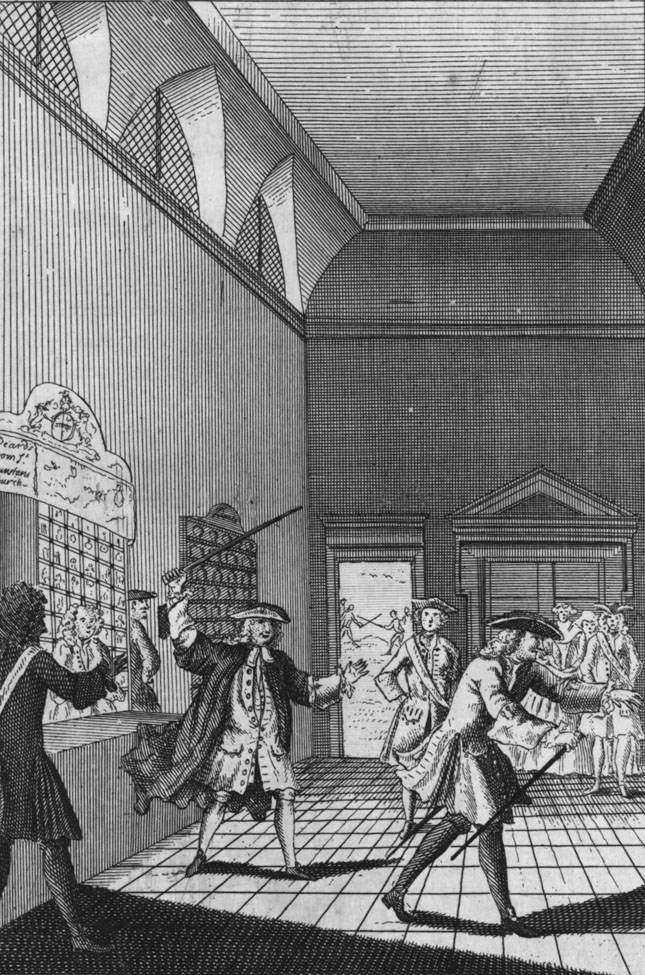 The pamphlets were most often occasional in nature, with each title printed in relatively few numbers. They sold for a few pence or a shilling on the streets and in bookshops, and their authors’ identities were mainly unknown at the time of publication.
The pamphlets were most often occasional in nature, with each title printed in relatively few numbers. They sold for a few pence or a shilling on the streets and in bookshops, and their authors’ identities were mainly unknown at the time of publication.
Over time, the Dobell purchase has been augmented with additional poems, primarily through the efforts of the late J. Keith Stewart who, as a professor in the Department of English, taught 18th c. poetry and fiction and helped build the collection. As he once remarked of these materials, they are of considerable variety and evident of the literary activity of the time. As such, they have often been used not only for literature classes, but for political science, history, and philosophy courses as well.
Though we often still refer to them as “anonymous” poems, in the decades since the pamphlets were acquired, scholarship has revealed some to be authored by the notable poets of the day, such as Alexander Pope. While many are extremely rare with only a few copies known, in some instances the UC copy of a particular poem is unique.
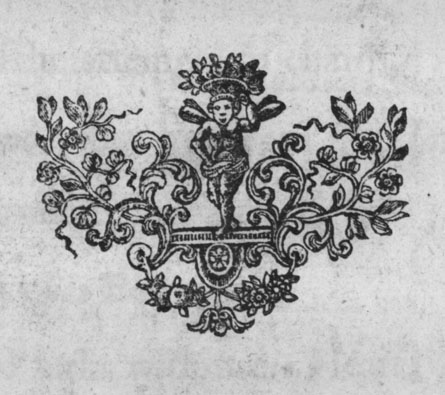 The English Short Title Catalogue and David Foxon’s English Verse, 1701-1750 (1975) cover most of the pamphlets, but in actuality their use has been somewhat hampered by how they are currently bound – diverse pamphlets and subject matter gathered together in folios
The English Short Title Catalogue and David Foxon’s English Verse, 1701-1750 (1975) cover most of the pamphlets, but in actuality their use has been somewhat hampered by how they are currently bound – diverse pamphlets and subject matter gathered together in folios
and quartos, cheek by jowl and elbow by arse. Then again, we do have a listing of all of them and the aspect of serendipitous discovery (for instance, the poems on the gin craze in England) has led to some insightful teaching and learning.
As autumn semester begins this coming August, several of these remarkable pieces of literature will be on view in the Archives & Rare Books Library as part of an ARB exhibit on the Enlightenment.

